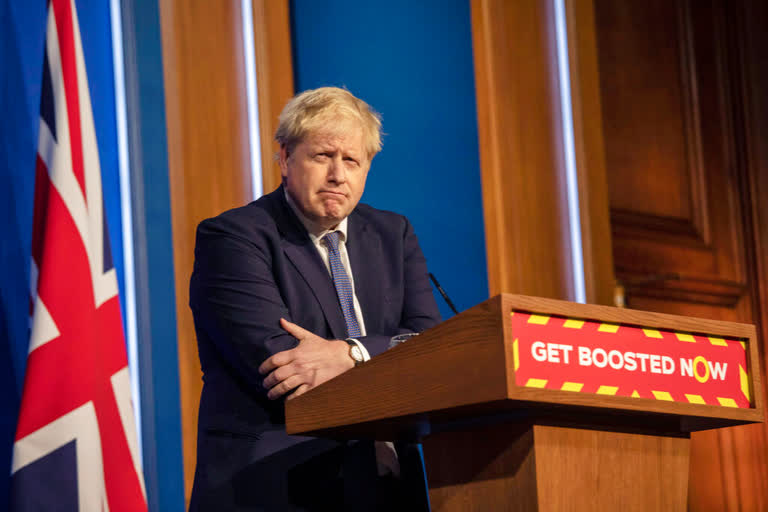London: British Prime Minister Boris Johnson faced a high-stakes showdown Wednesday in Parliament that could help defuse a crisis over claims that he and his staff broke coronavirus lockdown rules by holding illicit parties, or fan the flames even further.
Opponents and allies alike want Johnson to come clean about whether he attended a gathering in May 2020, when Britain was under a strict lockdown imposed by Johnson to curb the spread of the coronavirus. Johnson has so far declined to comment on reports he was at the "bring your own booze" get-together in the garden of his Downing Street residence.
An invitation to the "socially distanced drinks" gathering was emailed to about 100 people by a senior prime ministerial aide. At the time, people in Britain were barred by law from meeting more than one person outside their household.
Johnson's lunchtime appearance at the weekly Prime Minister's Questions session in the House of Commons will be his first public appearance since details of the party emerged. On Tuesday, a spokesman declined to comment on the allegations, citing an ongoing investigation by a senior civil servant, Sue Gray, into several alleged parties by government staff.
Johnson has previously said that he personally broke no lockdown rules, but his troubles are mounting. Angela Rayner, deputy leader of the opposition Labour Party, said Johnson's refusal to say whether he was at the May 2020 party was "astonishing."
"People have been reflecting about what was happening to them at the time in May and many people are still grieving their loved ones who they weren't able to say goodbye to at the time, and to think the prime minister was laughing and partying is just unforgivable," she told the BBC.
Rayner said that if Johnson had "lied to the British public, lied to Parliament and he has attended parties during lockdown, then his position is untenable."
The scandal dubbed "partygate" has become the biggest crisis of Johnson's two-and-a-half years in power. During the U.K.'s first lockdown, which began in March 2020 and lasted for more than two months, almost all gatherings were banned. Millions of people were cut off from friends and family, and even barred from visiting dying relatives in hospitals. Thousands were fined by police for breaking the ban on gatherings.
So there has been widespread anger at claims that Johnson's Conservative government flouted the rules it had imposed on the rest of the country by holding garden parties, Christmas get-togethers and office quiz nights in Downing Street, which is both the prime minister's home and his office.
Opposition politicians are calling for Johnson's resignation. More worryingly for the prime minister, many members of his own party are increasingly concerned about Johnson's judgment and leadership.
The Conservatives picked Johnson as leader in 2019 for his upbeat manner and popular touch, and despite the serial allegations of rule-bending and dishonesty that have followed him through his twin careers as journalist and politician. The choice appeared vindicated when he led the party to a big election win in December that year.
But support inside the party is being eroded by discontent over continuing pandemic restrictions, which some Conservatives view as draconian. He is also facing disquiet about his judgment after a slew of financial and ethical misconduct allegations against him and his government.
The Conservatives have a history of ousting leaders if they become a liability - and a recent surprising loss in a by-election for a district the party held for more than a century has increased their jitters. Conservative legislator Christian Wakeford urged Johnson not to "defend the indefensible."
"It's embarrassing and what's worse is it further erodes trust in politics when it's already low," Wakeford wrote on Twitter. "We need openness, trust and honesty in our politics now more than ever and that starts from the top!"
Another Conservative lawmaker, Tobias Ellwood, said Johnson needed to apologize and "show some contrition" if he wanted to ride out the storm.
"We can't allow things to drift, that is not an option," he told Sky News.
(AP)



